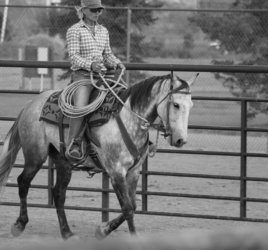Certainty vs Conviction
 Ask a horseman how to solve a particular problem with a horse, the answer will most likely be “It depends.” If you are someone who wants the certainty of an answer you might find that response somewhat frustrating. While there is much you can be certain about with a horse, a simple answer is rarely one of them. The horse’s lawyer, Tom Dorrance, summed it up nicely “A horse is only afraid of two things, things that move and things that don’t.”
Ask a horseman how to solve a particular problem with a horse, the answer will most likely be “It depends.” If you are someone who wants the certainty of an answer you might find that response somewhat frustrating. While there is much you can be certain about with a horse, a simple answer is rarely one of them. The horse’s lawyer, Tom Dorrance, summed it up nicely “A horse is only afraid of two things, things that move and things that don’t.”
It was a discussion on certainty versus conviction that I had the great opportunity to participate in that brought this months article to the newsletter. It was as if I had engaged two leadership experts for a private session on the question “Who is in charge of my own success?”. Paraphrasing the definition presented “those who work under the idea of certainty believe that what they know or hold is true, working with conviction allows room for a dialogue.”
Certainty is simple and ideas are often presented as right or wrong, this is how it must be done, or as fact. Take for example Bush’s speech to Congress following 9/11 “you are either with us or you are with the terrorists”. A statement not open for debate, you agreed or you were, put simply, the enemy. Certainty offers little room for interpretation and control over the outcome is given to someone else.
On the other hand, conviction offers the position that “I stand for something and feel strongly about it but I’m open minded to hear what you think”. For those who follow something with conviction it is ok to question an idea, challenge an interpretation or include your own perspective. Conviction doesn’t need to be seen as fact but as a view or belief that has worked for you. When you have conviction about something you believe you have control over the outcomes and are willing to engage in a discussion to that end because you own the idea.
A perfect example of people holding belief over their impact on an outcome has recently unfolded half way around the world. For three weeks the Egyptian people acted with the conviction, no longer willing to accept the status quo. The certainty of religion, gender, race and status were not presented as barriers as people took to the streets by the hundreds of thousands, until Mumbarek finally stepped down February 11. What is clear is that each individual took responsibility to play their part in ushering in a new era.
Leadership as demonstrated by Bush’s statement is a command control style it weighs on our fears and expects compliance, in fact the cost of questioning or defiance has already been defined. Leading with conviction requires self awareness and authenticity, in Egypt’s case it was one individual inspiring and convincing another that change was possible. It was truly authentic and collaborative leadership in action.
The difference between the two for either horsemanship or leadership comes down to those who are self aware and authentic about what they desire to learn and offer. Learning from one teacher or the other can simply help complete the picture we are creating for ourselves. I choose to follow my horsemanship path with conviction I present the best offer to my horse, I try and maintain a fair approach, I work hard to manage my emotions and I continue to explore ideas and environments where I can be my best. Of that, you can be certain.



